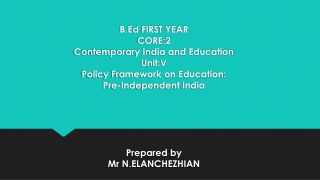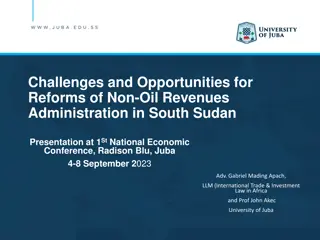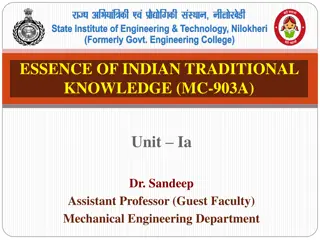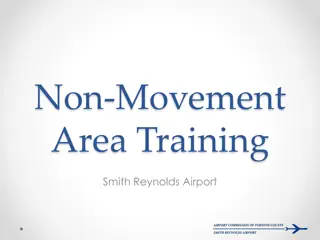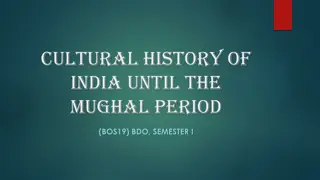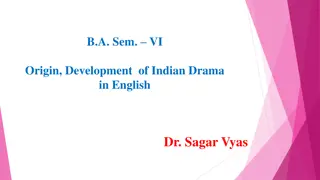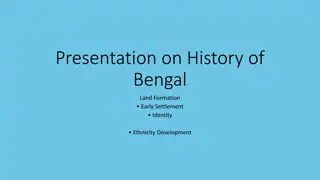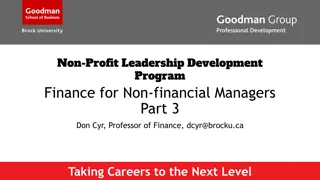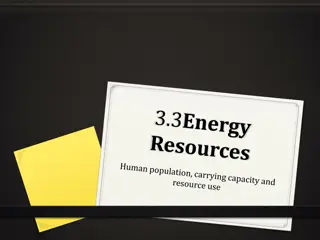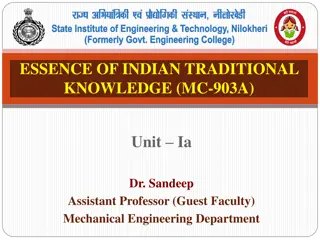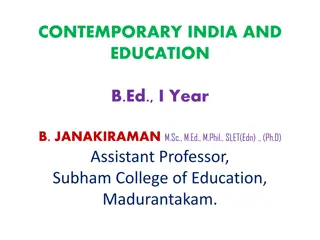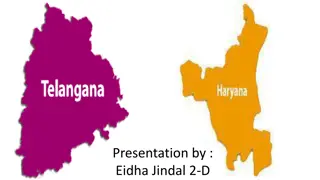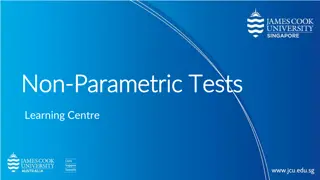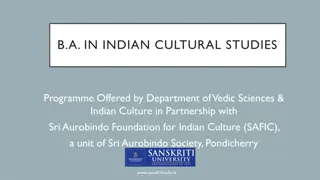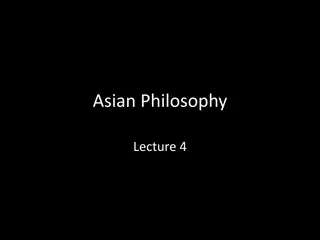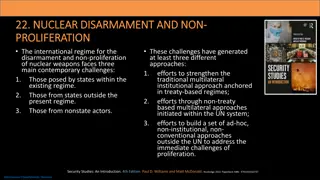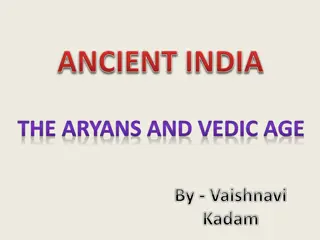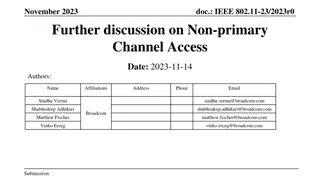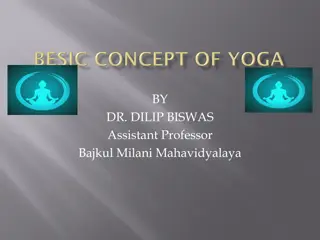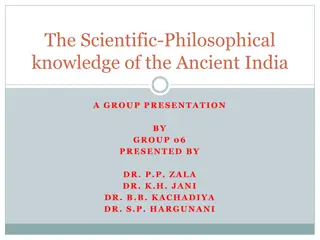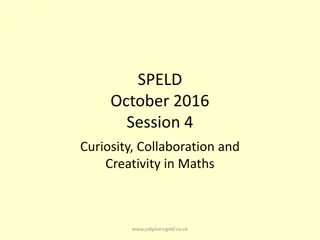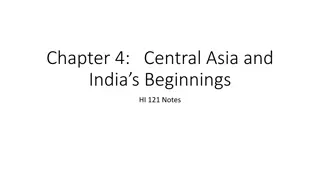Education in Ancient India: Vedic System Overview
The history of education in ancient India traces back to the Vedic system, rooted in the Vedas and emphasizing self-realization and liberation. The curriculum included Vedic literature, arithmetic, geometry, and spiritual studies, fostering academic freedom and discipline among students.
0 views • 9 slides
Women and Education
Women's education in India has evolved over time, from the Vedic period to colonial India. Despite challenges faced in medieval times, efforts have been made to empower women through various forms of education. Education plays a crucial role in shaping the future of women and society as a whole, pro
0 views • 15 slides
Challenges and Opportunities for Reforms of Non-Oil Revenues Administration in South Sudan
The presentation highlights the reliance on oil revenues in South Sudan and the need for reforms in non-oil revenue administration. It discusses sources of non-oil revenue, factors hindering revenue mobilization, and opportunities for reforms to diversify the economy. The objectives of non-oil reven
3 views • 23 slides
Exploring Citizen Journalism and Non-Fiction Writing
Explore the world of citizen journalism and non-fiction writing, learning about text types, adapting writing to conventions, considering audience, purpose, and tone. Discover the significance and usefulness of non-fiction writing, and delve into creating various text types. Uncover the role of citiz
1 views • 11 slides
The Essence of Indian Traditional Knowledge: Vedic Culture and History
The Vedas, ancient religious texts of Hinduism, provide essential knowledge about existence and the divine. Believed to have always existed, they were orally transmitted before being written down between 1500-500 BCE in India. The Vedas are considered among the oldest religious works and are categor
1 views • 41 slides
Administration: Ancient, Medieval and colonial
The evolution of administration in India traces back to the earliest monarchial systems in the Vedic period, progressing through texts like Arthshastra and principles of hierarchy. Ancient administrators emphasized decentralization and hierarchical structures. Arthshastra acted as a manual for admin
2 views • 17 slides
Features of Jainism: An Overview Presented by Debajit Hazarika, Assistant Professor
Jainism is an ancient non-Vedic religion with roots tracing back to the times of the Indus Valley Civilization. It emphasizes non-violence, self-conquest, and spiritual liberation through 24 Tirthankaras, with Lord Mahavira being the most significant. Jainism stands out with its rejection of caste d
1 views • 7 slides
Establishing Safety Standards in Non-Movement Areas at Smith Reynolds Airport
This guide outlines the purpose, definitions, rules, and safety measures for operating vehicles in non-movement areas at Smith Reynolds Airport. It emphasizes standardized ground movement practices to ensure the safety of airport patrons, reduce the risk of injury, and maintain a high level of safet
1 views • 12 slides
Cultural History of India: Early Vedic Period and Aryans
The period of the Aryans in ancient India marked a transition from the Indus Valley Civilization to the Vedic Civilization. The Aryans, possibly migrants from various regions, integrated with the indigenous Dravidians to form the Vedic society. Their culture, as depicted in the Vedas and epics like
0 views • 10 slides
Origin and Development of Indian Drama in English
Indian English Drama has a rich history, starting from the Sanskrit plays of the Vedic Age to prominent playwrights like Rabindranath Tagore and Sri Aurobindo Ghosh. The genre saw a resurgence in the 20th century with significant contributions from various playwrights marking its evolution through s
0 views • 8 slides
Understanding Metals, Non-Metals, and Their Properties in the Periodic Table
Classification of elements into metals, non-metals, and metalloids based on their properties is essential. Metals are known for their conductivity and malleability, while non-metals have contrasting features like brittleness and poor conductivity. This detailed overview explores the physical propert
0 views • 31 slides
Historical Evolution of Bengal: Land Formation & Cultural Development
Ancient Bengal, known as Vanga, witnessed territorial evolution from early Vedic literature to political prominence under different dynasties like Palas and Guptas. The region's history reflects a rich tapestry of cultural change, ethnic identity, and settlement pattern, especially during Buddhist p
0 views • 10 slides
Non-Profit Leadership Development: Finance Essentials for Managers
Explore the key concepts of finance for non-financial managers in the non-profit sector. Learn about cost benefit analysis, measures of project worthiness, and essential financial tools such as NPV, IRR, and ROI. Understand how to assess project risks and make informed financial decisions to enhance
1 views • 47 slides
Overview of Energy Resources: Renewable and Non-Renewable
Energy resources are classified into renewable and non-renewable types, with a mix of both used worldwide. Non-renewable resources dominate global energy consumption, with fossil fuels like oil, natural gas, coal, and nuclear energy being major sources. While non-renewable sources still dominate, ef
1 views • 20 slides
Understanding Non-Aqueous Solvents: Types and Classification
Inorganic non-aqueous solvents play a crucial role in chemical research and industry. This article by Dr. Princy K.G. delves into the classification of solvents based on protonicity, polarity, and aqueous vs. non-aqueous nature. It explores the types of non-aqueous solvents, such as protonic and non
1 views • 29 slides
Essence of Indian Traditional Knowledge: Vedic Culture and the Vedas
The Vedas, ancient religious texts of Hinduism, are considered among the oldest in the world, passed down orally before being written in the Vedic Period in India. They contain knowledge about existence, not revealed at a specific historical moment but perceived by sages through deep meditation.
0 views • 41 slides
Vedic Education System in Contemporary India: A Historical Overview
Explore the roots of education in pre-independent India, focusing on the Vedic system with its objectives, curriculum, and Gurukula education model. Learn about the teacher-student relationship and the central role of the teacher in shaping learners' lives. Discover the spiritual and intellectual de
0 views • 22 slides
Rich Culture and Gastronomic Delights of Telangana and Haryana
Explore the vibrant cultural heritage of Telangana, boasting a history of 5,000 years, while savoring its spicier cuisine and traditional attire. Delve into Haryana's mystical charm, steeped in Vedic traditions, and relish its authentic dishes like Bajra Aloo Roti and Kachri Ki Chutney.
0 views • 12 slides
Understanding Non-Parametric Tests and Their Applications
Non-parametric tests serve as valuable alternatives to parametric tests when data do not meet specific criteria. This article explores the concept of non-parametric tests, types of non-parametric tests, and provides insights on conducting the Mann-Whitney U Test using SPSS for practical research app
4 views • 32 slides
Understanding Non-Clinical Development in Therapeutic Innovation
The European Patients Academy on Therapeutic Innovation focuses on the non-clinical development phase of medicine, delving into efficacy assessment, safety evaluation, and manufacturing process considerations. Non-clinical studies are essential for decision-making in clinical trials, marketing appli
1 views • 26 slides
Rise of Janapadas and Mahajanapadas in Vedic India
The rise of Janapadas and Mahajanapadas marked a significant transition in the political landscape of Vedic India. Janapadas, major kingdoms of that era, evolved into more powerful Mahajanapadas through territorial expansion and urbanization. The shift from tribal polities to territorial states led
0 views • 9 slides
Understanding Non-Firm Quantities in Electricity Markets
Non-Firm Quantities in electricity markets involve units with non-firm access not being compensated for their non-firm capacity not getting accommodated on the system. The concept of Firm Access Quantity plays a key role in determining compensation levels for units, with differences in implementatio
0 views • 6 slides
Comprehensive Campus Recruitment Training (CRT) Program
Enhance your skills with our Campus Recruitment Training (CRT) program covering various topics such as aptitude tests, Vedic Mathematics, verbal reasoning, logical deductions, and more. Access study materials, online mocks, and hands-on sessions to prepare for company-specific interviews and tests.
0 views • 11 slides
Understanding Non-Compete Agreements: Enforceability and Requirements
Non-compete agreements are commonly used in the United States to protect businesses from competition by former employees. To be enforceable, these agreements must meet certain requirements, including independent consideration, protection of legitimate business interests, and reasonableness in scope,
0 views • 26 slides
Comparison of Trigger-based vs. Non-Trigger-based Sensing Measurement in IEEE 802.11
The document discusses the differences between Trigger-based (TB) and Non-Trigger-based (Non-TB) sensing measurement instances in IEEE 802.11 standards, focusing on who initiates the sensing measurement. TB sensing is initiated by the AP, while Non-TB sensing is initiated by a non-AP STA, enabling o
6 views • 13 slides
Education in Ancient India: Vedic System Overview
Education in ancient India began with teaching traditional elements like Indian religions, mathematics, and logic. The Vedic system of education was based on the Vedas, focusing on spiritual and materialistic knowledge. The ultimate aim was self-realization and liberation of the soul. The curriculum
0 views • 9 slides
B.A. in Indian Cultural Studies Programme by Department of Vedic Sciences & Indian Culture
Explore the B.A. in Indian Cultural Studies programme offered by the Department of Vedic Sciences & Indian Culture in partnership with Sri Aurobindo Foundation for Indian Culture. Delve deeper into the spiritual foundations, history, and key contributions of Indian civilization while preparing for a
0 views • 13 slides
Traditional Food Practices and Beliefs in India, Pakistan, and Bangladesh
Explore the historical background and traditional beliefs surrounding Indian, Pakistani, and Bangladeshi foods. Discover the differences in religious practices, the influence of Vedic scriptures on food choices, and the categorization of foods into Sattvic, Rajasic, and Tamasic categories based on t
1 views • 29 slides
The Two Trends of Indian Philosophy: Naturalism vs. Spiritualism
Indian philosophy is characterized by two dominant trends - naturalism/materialism and spiritualism/theism. The Charvaka school represents the naturalistic perspective, rejecting Vedic authority and advocating for materialism. They emphasize perception as the sole source of knowledge and deny concep
0 views • 15 slides
Contemporary Challenges in Nuclear Disarmament and Non-Proliferation Regime
The international regime for nuclear disarmament and non-proliferation faces challenges from states within and outside the regime, as well as non-state actors. Various approaches are being utilized to address these challenges, including strengthening multilateral institutions, non-treaty-based multi
0 views • 12 slides
Improving Attainment and Progress of Disadvantaged Pupils in Sheffield
Attainment and progress of disadvantaged pupils in Sheffield show an improving trend across key stages, although the gaps between disadvantaged and non-disadvantaged students are not closing fast enough. Data suggests that disadvantaged pupils with low prior attainment are making better progress in
0 views • 29 slides
Understanding Non-Profit Accounting Essentials
Learn the basics of non-profit accounting, including what defines a non-profit organization, common types of non-profits, governance structures, and legal responsibilities. Discover key insights on IRS and state requirements for non-profits in this informative presentation by Jessica Sayles, CPA fro
0 views • 55 slides
The Aryans and Vedic Age - An Overview of Early and Later Vedic Periods
The Aryans, believed to have originated from Central Asia, played a significant role in shaping the Vedic Age in ancient India. This period saw the emergence of key political, economic, and religious developments, contributing to the foundation of Hinduism. From the Early Vedic Period characterized
0 views • 19 slides
Further Discussion on Non-primary Channel Access in IEEE 802.11
This contribution delves into the utilization of non-primary channels for access in IEEE 802.11 networks, focusing on enhancing frequency reuse, adhering to ETSI standards, evaluating CCA capability types, and analyzing non-ideal deployment scenarios. It discusses the complexity and benefits of non-
0 views • 26 slides
Understanding the Paths of Yoga: Karma, Bhakti, Gyana, Raj, and Hatha Yoga
Yoga, originating from Vedic scriptures, offers paths like Karma, Bhakti, Gyana, Raj, and Hatha Yoga to attain the ultimate reality. Each path focuses on different aspects such as action, devotion, knowledge, and physical practice, leading to a holistic development of the mind and body.
0 views • 11 slides
Ancient Indian Scientific and Philosophical Knowledge: A Remarkable Insight
Explore the profound scientific and philosophical insights of ancient India as presented by Group 06 with a focus on remarkable achievements like the velocity of light, the Big Bang theory, Vedic astronomy, and concepts such as the heliocentric solar system. Dive into ancient texts like the Rig-Veda
0 views • 22 slides
Non-Negative Tensor Factorization with RESCAL
This article discusses non-negative tensor factorization with RESCAL, covering topics such as Non-Negative Matrix Factorization, Multiplicative Updates, RESCAL for Relational Learning, and Non-Negative Constraint for RESCAL. It explores how factorizing matrices/tensors into non-negative factors can
0 views • 11 slides
Exploring Curiosity and Creativity in Mathematics
Delve into the fascinating world of mathematics through the lens of curiosity, collaboration, and creativity. Uncover the impact of curiosity on memory, the magic of mathematics explained by Bharati Krishna, and intriguing Vedic math techniques. Discover the art of proposing questions in mathematics
0 views • 58 slides
Certificate Courses in Indian Cultural Studies by Department of Vedic Sciences & Indian Culture
Explore month-long certificate courses in Indian Cultural Studies offered by the Department of Vedic Sciences & Indian Culture in collaboration with Sri Aurobindo Foundation for Indian Culture. Delve into India's rich cultural heritage to gain insights into ancient wisdom traditions, prepare for con
0 views • 8 slides
Early Civilizations and Trade Networks in Central Asia and India
The chapter explores the Indus Valley Civilization, early trade routes, and urbanized societies like Mohenjo-Daro and Harappa in India. It delves into the significance of Central Asia's steppe lands, the Vedic Epoch, and the cultural developments in the region during ancient times.
0 views • 19 slides
